June 6, 2025 | 00:03 GMT +7
June 6, 2025 | 00:03 GMT +7
Hotline: 0913.378.918
June 6, 2025 | 00:03 GMT +7
Hotline: 0913.378.918
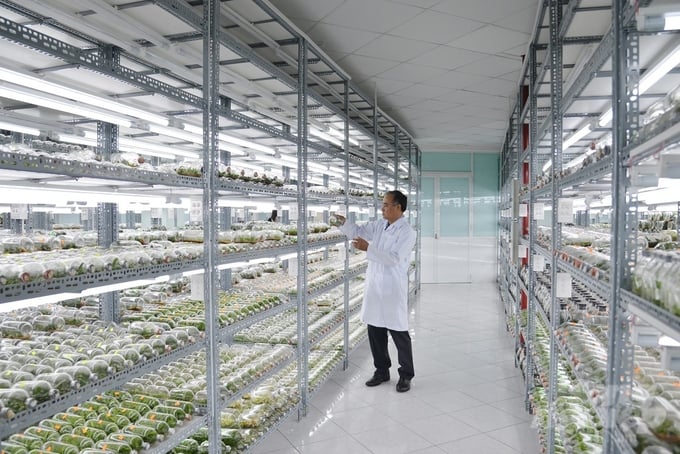
Plant tissue culture laboratory for breeding work at the Agricultural High-Tech Park of Ho Chi Minh City. Photo: Nguyen Thuy.
In the context of urbanization, increasingly narrowed agricultural land, and increasingly difficult production conditions, Ho Chi Minh City has determined that urban agriculture development along with the application of science and technology is the inevitable direction. Ho Chi Minh City's leaders have issued guidelines and policies for agricultural development in the direction of high technology. One of the important solutions is the application of science and technology, promoting the implementation of research, application, and transfer of science and technology to Ho Chi Minh City and other provinces and cities.
The Agricultural Hi-Tech Park of Ho Chi Minh City (AHTP) is the first unit formed in the country under the establishment decision in 2004. It has started the process of construction, formation, and operation since 2010 with an area of over 88ha in Pham Van Coi commune, Cu Chi district, from the city budget. AHTP has four dependent centers, including the Center for Business Incubation of Agricultural High Technology (AHBI), the Research and Development Center for Hitech Agriculture (AHRD), the Infrastructure Exploitation Center (AHIE), and the High-Tech Agriculture Training Center (AHTC). After AHTP’s formation, many other localities also began to form agricultural high-tech parks, such as in Phu Yen, Bac Lieu, Dak Nong, An Giang, and Dong Thap.
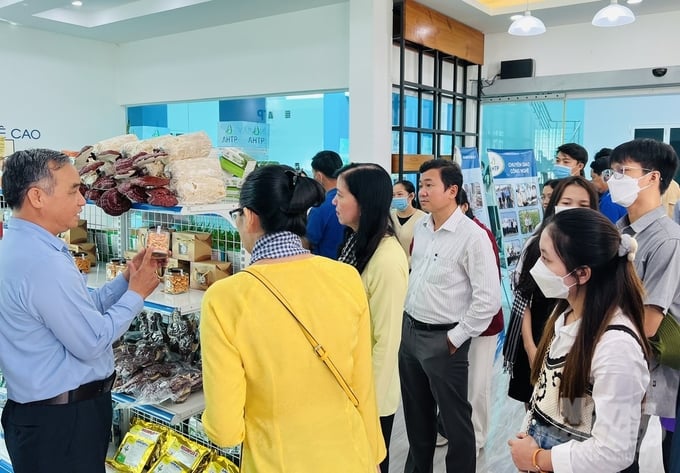
The Agricultural Hi-Tech Park of Ho Chi Minh City regularly welcomes delegations to visit, study, and transfer science and technology. Photo: Nguyen Thuy.
In the process of construction, formation, and development, AHTP is the production center for crop and animal seeds with high productivity, quality, added value, and safety in the region. Thereby contributing to environmental protection, better meeting the market’s demand for clean vegetables, fresh flowers, ornamental fish, and cow's milk, and the AHTP’s development associated with tourism development with the city's characteristics.
AHTP has become a pioneer unit in performing the function of supporting, influencing, and leading the agriculture of the city in particular and the whole country in general to develop towards modern urban agriculture with stable and sustainable ecological efficiency and high-tech application in production, productivity enhancement, and quality improvement of agricultural products. This place also attracts and gathers domestic and foreign resources to invest in agricultural high-tech in the direction of urban agriculture.
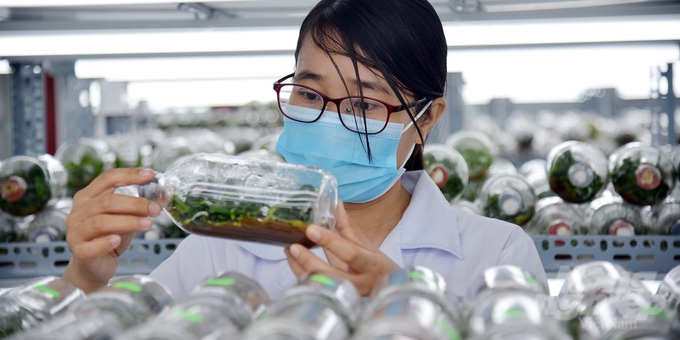
Each year, the AHTP’s laboratory can meet 1-2 million seedlings of all kinds. Photo: Nguyen Thuy.
Scientific and technological activities researched and implemented at AHTP by AHRD have been focusing on researching, formulating, implementing, and perfecting technologies for hybridization and testing of new varieties and demonstrating agricultural production models in the fields of vegetables, orchids, ornamental plants, medicinal plants, ornamental creature varieties, and mushroom varieties on the basis of high-tech application. The activities thus contribute to the improvement of technological processes to create products of high quality, food safety, etc.
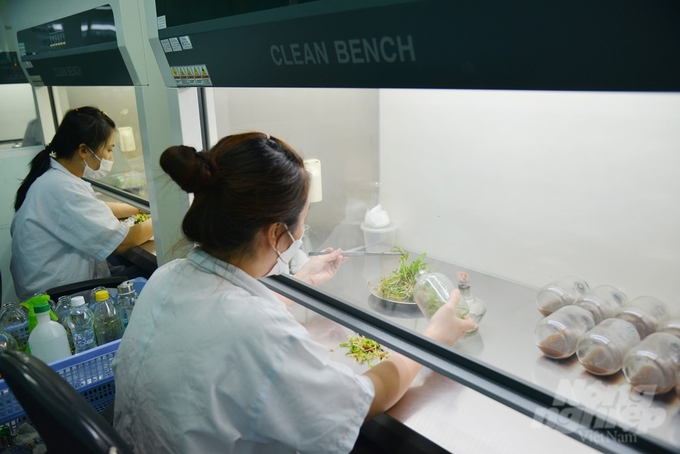
Breeding orchids in the laboratory. Photo: Nguyen Thuy.
According to Mr. Le Van Cua, Deputy Head of the AHTP’s Management Board, the plant tissue culture laboratory performs the steps in the propagation process with the biotechnological method of tissue culture. Seedlings are researched, selected, and hybridized, as well as multiplied by a fast coefficient, to meet the purpose of serving agricultural production in Ho Chi Minh City in particular and the provinces in the region in general. With current human resources and facilities, this laboratory can each year meet the needs of 1-2 million seedlings of all kinds.
Regarding seed supply, Deputy Head Le Van Cua said that together with businesses in AHTP, this laboratory can supply 6 tons of seeds of all kinds per year. In addition, it also provides biological products as well as edible mushrooms, medicinal mushrooms, embryo bags (about 600,000 to 1 million bags of embryos), ornamental fish varieties, and shrimp varieties.
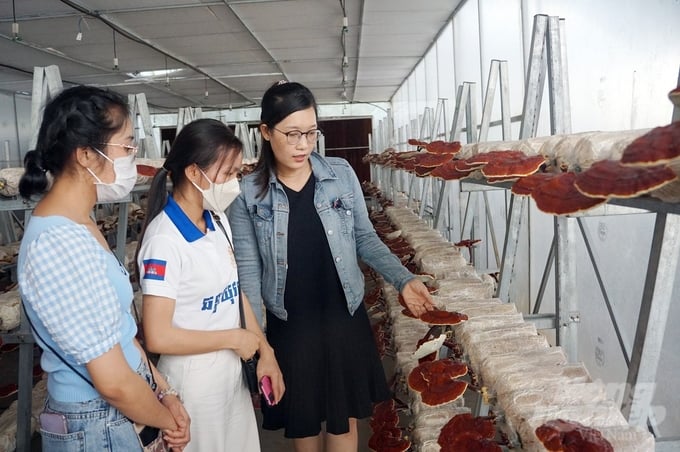
The lingzhi mushroom farming model at the Agricultural High-Tech Park of Ho Chi Minh City. Photo: Nguyen Thuy.
The AHTP’s Management Board sets a target by 2023 to basically complete the agricultural hi-tech parks and put them into use, including: a construction project of an agricultural hi-tech park for fisheries in Can Gio with an area of more than 85ha; a project to expand the existing agricultural hi-tech park by more than 23ha in Phuoc Vinh An commune, Cu Chi district; a project to invest in a 200-ha agricultural hi-tech park for animal husbandry in Binh District; and a project to expand the agricultural hi-tech park for cultivation to 200ha in Cu Chi District.
Of which, the target rate of application of scientific and technological research tasks and trial production topics is over 60% of the total number of approved research topics. AHTP also focuses on promoting the activities of transferring technology and commercializing products to achieve an economic efficiency of VND 3-5 billion/year.
One of the successful models transferred by AHTP to units and individuals in the area as well as other provinces is the circulating hydroponic leafy vegetable growing model. With this model, the unit will advise, design, and directly guide the implementation of the greenhouse model, irrigation system, seeding, and care until harvest. With this model, the daily harvest productivity can reach 100–150 kg of vegetables on an area of 1,000 m2.
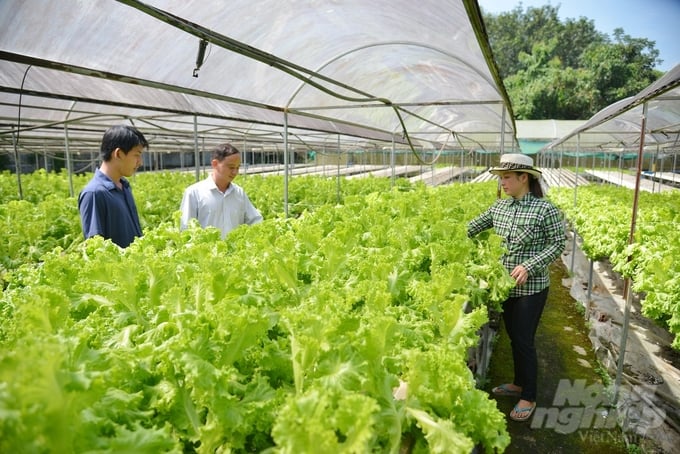
The circulating hydroponic leafy vegetable model has been transferred by AHTP to units and individuals in the area of Ho Chi Minh City as well as other provinces. Photo: Nguyen Thuy.
"With the circulating hydroponic system, the nutrients will be mixed directly in the tank, then supplied directly to the circulating irrigation pipe. At the end of the pipe, there will be a system to recover nutrients and water back into the tank. Consequently, nutrients and water are not lost or released into the environment during the care process, thereby taking advantage of nutrients and water for plants, so they do not pollute the environment," said Mr. Hoang Dac Hiet, Deputy Director of AHRD.
In addition to transferring science and technology to units, individuals, cooperatives, and businesses in Ho Chi Minh City, AHTP also transferred science and technology to other provinces such as Phu Yen, Bac Lieu, and Hau Giang. Dong Thap, Lam Dong, Dak Nong, Tien Giang, Vinh Long, Ben Tre, etc. "Every year, we transfer the models of automated production and information technology application in production process management to more than 65 businesses and organizations in the southern and northern provinces," said Mr. Le Van Cua, Deputy Head of the AHTP’s Management Board.
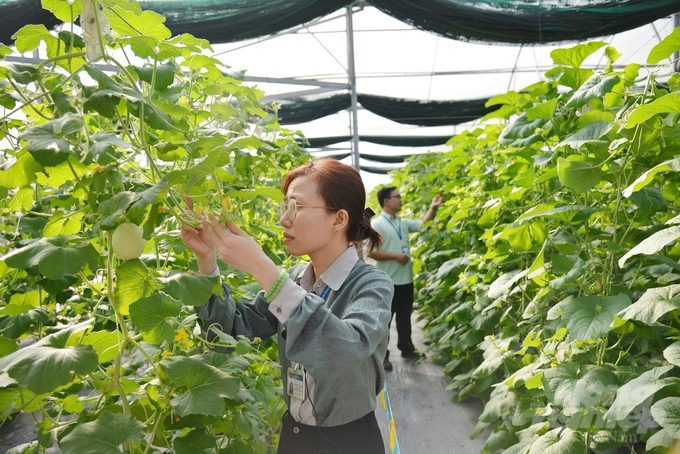
The Agricultural Hi-Tech Park of Ho Chi Minh City has submitted a registration dossier for the protection of cantaloupe varieties and is conducting a test of bitter melon varieties to be recognized as a national variety. Photo: Nguyen Thuy.
According to Mr. Dinh Minh Hiep, Director of the Ho Chi Minh Department of Agriculture and Rural Development, over the past time, the Agricultural High-Tech Park of Ho Chi Minh City and the Biotechnology Center of Ho Chi Minh City have promoted the role of cohesion between schools, businesses, cooperatives, and farmer households. In particular, demonstration models have been built to spread to people and businesses, thereby increasing the value of key products in Ho Chi Minh City's agricultural sector.
Regarding variety development, Mr. Dinh Minh Hiep said that the city is working with institutes and schools to build varieties and preserve indigenous varieties in Ho Chi Minh City as well as some provinces. Take that as a premise to build the best hybrid combinations, with the goal of encouraging the use of Vietnamese varieties more than that of imported varieties.
Translated by Huyen Vu Thu
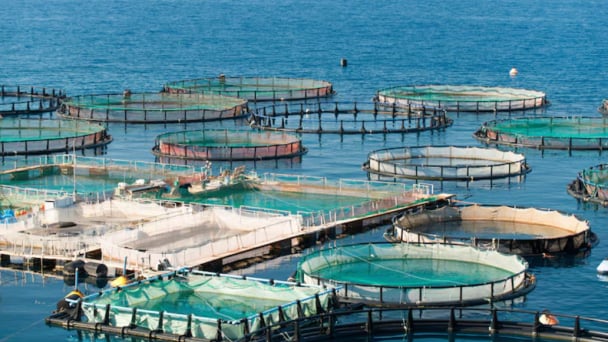
(VAN) Technology is redrawing the map of Vietnamese aquaculture: more modern, greener, and more sustainable.

(VAN) Novel process harnesses machine learning to reveal groups of genes that determine how efficiently plants use nitrogen.

(VAN) Several scientists and farmers are experimenting with soil treatment in some key durian-growing regions such as Cai Lay (Tien Giang), Dak Song, Gia Nghia, and Dak R’lap (Dak Nong).
/2025/05/25/4127-3-073637_820.jpg)
(VAN) Thanks to the promotion from an FAO-implemented project, vegetable production in greenhouses in Moc Chau has seen strong development, from 1.5 hectares in 2021 to nearly 50 hectares in 2024.

(VAN) FAO has recently supported USD 140,000 to implement the project 'Risk mitigation human-animal interface risks through disease control initiatives in pig farming.'

(VAN) The People's Committee of Tra Vinh province has approved an adjustment to the investment policy for the Green Hydrogen Plant project, increasing its area to approximately 52.76 hectares.
![Reducing emissions from rice fields: [2] Farmers’ commitment to the soil](https://t.ex-cdn.com/nongnghiepmoitruong.vn/608w/files/news/2025/05/05/dsc08881jpg-nongnghiep-140632.jpg)
(VAN) Clean rice cultivation model in Thuong Tan commune, Bac Tan Uyen district, is assisting local residents in achieving sustainable agriculture by substantially reducing costs, increasing productivity, and protecting the environment.